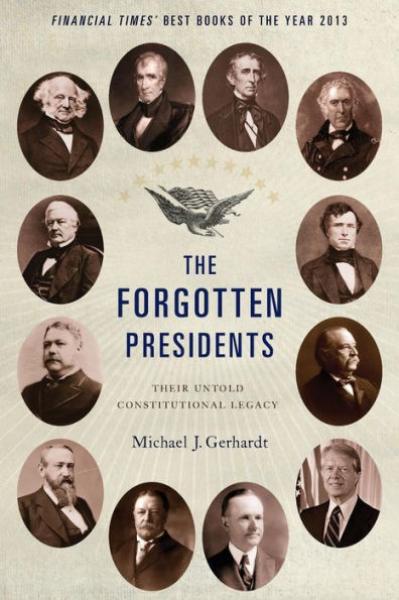Description
Gerhardt, one of our leading legal experts, tells the story of The Forgotten Presidents. He surveys thirteen administrations in chronological order, from Martin Van Buren to Franklin Pierce to Jimmy Carter, distinguishing political failures from their constitutional impact. Again and again, he writes, they defied popular opinion to take strong stands. Martin Van Buren reacted to an economic depression by withdrawing federal funds from state banks in an attempt to establish the controversial independent treasury system. His objective was to shrink the federal role in the economy, but also to consolidate his power to act independently as president. Prosperity did not return, and he left office under the shadow of failure. Grover Cleveland radically changed his approach in his second (non-consecutive) term. Previously he had held back from interference with lawmakers; on his return to office, he aggressively used presidential power to bend Congress to his will. Now seen as an asterisk, Cleveland consolidated presidential authority over appointments, removals, vetoes, foreign affairs, legislation, and more. Jimmy Carter, too, proves surprisingly significant. In two debt-ceiling crises and battles over the Panama Canal treaty, affirmative action, and the First Amendment, he demonstrated how the presidency's inherent capacity for efficiency and energy gives it an advantage in battles with Congress, regardless of popularity. Gerhardt explains the many things these and ten other presidents have in common that explain why, in spite of any of their excesses, they have become forgotten chief executives.
Incisive, myth-shattering, and compellingly written, this book shows how even obscure presidents championed the White House's prerogatives and altered the way we interpret the Constitution.
Incisive, myth-shattering, and compellingly written, this book shows how even obscure presidents championed the White House's prerogatives and altered the way we interpret the Constitution"--Provided by publisher.
The Forgotten Presidents run the gamut, from the truly important like Grover Cleveland to the truly forgettable like William Henry Harrison. But in recovering these stories, Michael Gerhardt reminds us that every president leaves a trace. The occupants of the highest office exercised power to reshape the nation they inherited, and in doing so they all sparked constitutional debates and transformed the constitutional landscape. Even our forgotten presidents helped shape the world we live in; a lesson worth remembering today. -Keith E. Whittington, William Nelson Cromwell Professor of Politics, Princeton University
Forgotten but not gone. In these captivating stories, Professor Gerhardt shows how even our lesser presidents shaped the constitutional order and the political world that 21st century Americans inhabit. --Michael C. Dorf, Robert S. Stevens Professor, Cornell University Law School
Product Details
- Oxford University Press, Brand
- Oct 1, 2014 Pub Date:
- 0199389985 ISBN-10:
- 9780199389988 ISBN-13:
- 352 Pages
- 9.1 in * 6.1 in * 1.1 in Dimensions:
- 1 lb Weight:




